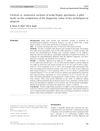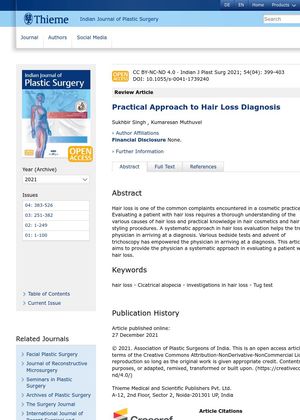 193 citations
,
January 2015 in “International journal of trichology”
193 citations
,
January 2015 in “International journal of trichology” Dermatologists need to understand hair products to treat hair and scalp issues better.
 86 citations
,
August 2014 in “Journal of The American Academy of Dermatology”
86 citations
,
August 2014 in “Journal of The American Academy of Dermatology” To diagnose hair loss, use a systematic approach including history, exams, and tests.
 69 citations
,
August 2014 in “Journal of The American Academy of Dermatology”
69 citations
,
August 2014 in “Journal of The American Academy of Dermatology” Trichoscopy is a quick, cost-effective tool for diagnosing different hair loss conditions.
 12 citations
,
February 2014 in “Recent Patents on Inflammation & Allergy Drug Discovery”
12 citations
,
February 2014 in “Recent Patents on Inflammation & Allergy Drug Discovery” Shampoos have evolved into multifunctional products with patented innovations for different hair needs and can include medicinal herbs for hair and scalp health.
 48 citations
,
May 2013 in “Canadian Medical Association Journal”
48 citations
,
May 2013 in “Canadian Medical Association Journal” Primary cicatricial alopecia, a rare disorder causing permanent hair loss, is hard to diagnose and treat, with treatments like anti-inflammatory drugs and steroids offering varied results and no guaranteed cure. Psychological support for patients is important, and future research should aim to identify causes of the condition.
 43 citations
,
January 2013 in “Indian Journal of Dermatology, Venereology and Leprology”
43 citations
,
January 2013 in “Indian Journal of Dermatology, Venereology and Leprology” The article concludes that advancements in hair cosmetics require dermatologists to stay informed about products and their potential risks, including allergies and higher risks for hairdressers.
 31 citations
,
October 2012 in “Dermatologic clinics”
31 citations
,
October 2012 in “Dermatologic clinics” Cosmetic hair products are important for hiding hair loss and improving satisfaction when combined with medical treatments.
 27 citations
,
September 2012 in “Dermatologic Clinics”
27 citations
,
September 2012 in “Dermatologic Clinics” The document concludes that using specific tools and tests is essential for identifying the cause of hair loss and deciding on the right treatment.
 54 citations
,
September 2012 in “Dermatologic Clinics”
54 citations
,
September 2012 in “Dermatologic Clinics” Some medications can cause hair loss, but stopping the drug usually leads to recovery within 3 months.
 19 citations
,
September 2011 in “Clinical and Experimental Dermatology”
19 citations
,
September 2011 in “Clinical and Experimental Dermatology” Transverse scalp sections are better for diagnosing non-scarring hair loss, while vertical sections are better for a specific scarring hair loss called lichen planopilaris.
 33 citations
,
April 2009 in “Clinical and Experimental Dermatology”
33 citations
,
April 2009 in “Clinical and Experimental Dermatology” Psychological factors like depression may be more important than zinc, folate, and vitamin B12 levels in causing scalp pain in people with hair loss.
 196 citations
,
June 2008 in “International Journal of Dermatology”
196 citations
,
June 2008 in “International Journal of Dermatology” Dermoscopy helps diagnose and manage alopecia areata by showing specific hair changes.
 304 citations
,
July 2006 in “Journal of The American Academy of Dermatology”
304 citations
,
July 2006 in “Journal of The American Academy of Dermatology” Videodermoscopy improves diagnosis of hair and scalp disorders and may reduce scalp biopsies.
 162 citations
,
August 2004 in “Journal of Investigative Dermatology”
162 citations
,
August 2004 in “Journal of Investigative Dermatology” Hair loss causes stress and affects mental health; treatment and support needed.
150 citations
,
July 2001 in “Clinics in dermatology” Proper haircare and communication with doctors are key to managing hair loss and avoiding damage.















